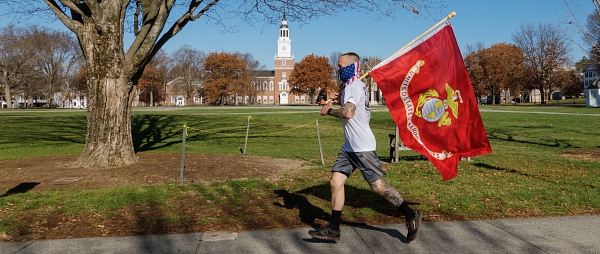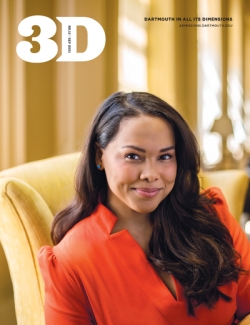Veterans
First order of business: thank you for your service. Dartmouth College admires and applauds the commitment and training of veterans and we welcome your applications. Learn more about our application process, wrap-around advising resources, and strong history of veteran support below.
Quick Links:
Dartmouth's History of Veteran Support
Your Veteran Experience at Dartmouth
Resources for Veterans at Dartmouth
FAQs
Applying to Dartmouth After Serving
Many veteran applicants have diverse or non-traditional educational backgrounds. In recognition of this, Dartmouth's admissions review process for veterans is flexible. The admissions office works with each applicant to help them fulfill the academic, testing, and recommendation requirements to apply. Admissions staff will also help veterans decide which application process—first year or transfer—is the best match for their current level of education.
Dartmouth offers application fee waivers to prospective veteran applicants and is a partner of Service to School.
Dartmouth is affordable. We are a proud participant in the GI Bill® and Yellow Ribbon Programs without limitation on the number of students who can access these benefits. We also guarantee to meet 100% of admitted students' financial need. Learn More.
Interested in learning more? Contact Associate Director of Admissions and Coordinator of Pipeline Development, Christina Moreland, for more information on applying to Dartmouth after serving and connect with admissions staff who can help.
Dartmouth's History of Veteran Support
Dartmouth's recent leadership in supporting veteran education can be traced to James Wright, the College's 16th president, who led the institution from 1998 to 2009.
President Wright, who served in the United States Marine Corps before becoming the first member of his family to graduate from college, was instrumental in collaborating with Senators John Warner, Jim Webb, and Chuck Hagel to draft language for the Post-9/11 GI Bill® that was passed by Congress and signed by President Bush in 2008.
The bill, which resulted in the Yellow Ribbon Program, gave private institutions like Dartmouth the means to partner with Veterans Affairs in supporting veterans who matriculated at their institutions. Wright also collaborated with the American Council on Education to launch a new counseling program for veterans seeking to continue their education.
Today, Dartmouth's veteran population comes from all five branches of the military. Roughly half of Dartmouth's diverse veteran cohort are the first members of their family to attend college, and the most popular majors in recent years have been government, Middle Eastern studies, philosophy, computer science, and classics.
GI Bill® is a registered trademark of the U.S. Department of Veterans Affairs (VA). More information about education benefits offered by VA is available at the official U.S. government Web site at http://www.benefits.va.gov/gibill.
Your Veteran Experience at Dartmouth
There isn't a reason why Dartmouth ranks so highly for the experience it offers veterans; there are several.
Dartmouth's small class sizes, its faculty's devotion to teaching, and the College's warm community ensure that every student has the support they need to thrive. The College also offers individualized advising specifically for veterans throughout their experience at the College, as well as a robust alumni network with resources and opportunities after graduation.
After her time in the military, Army veteran Vitallia Williams '22 (shown in image on left) found a passion for international relations and foreign policy at Dartmouth. Read more about Vitallia's Dartmouth experience in 3D Magazine.
Specific Resources for Veterans at Dartmouth
- Advising: Veterans work one-on-one with a dedicated Undergraduate Dean for Veterans.
- Peer Support: The Student Veterans Association, Dartmouth Uniformed Service Alumni group, and Veterans Club at Tuck provide peer support on and off campus.
- Housing: The Office of Residential Life works with veteran students to find the best housing option for them. The office accommodates students who come to campus with families, partners, service animals, and pets. Veteran students are able to live on or off campus and have support to find housing.
- Healthcare: Veterans have access to healthcare on campus through Dartmouth Health Services and off campus at the White River Junction VA Hospital, located 15 minutes away by shuttle in White River Junction, Vermont.
Meet some of our student veterans:
Frequently Asked Questions:
How does the application process work?
Veterans can apply as first-year students or as transfer students, depending on both their previous college experience and also their interest in transferring previously earned credits. Most veterans with prior experience in college or university choose to apply as a transfer, in part because receiving credit for previous coursework is easier for students who enroll as transfers.
First-year students can apply via the Common Application; transfer students can apply via the Dartmouth Transfer Application, which opens each January on our website.
Standardized testing is a required element of Dartmouth's first-year and transfer application. Refer to our Testing Policy page for guidance. Note for transfer applicants: if you did not take standardized tests for your first-year admissions process, if your scores are more than five years old, or if sitting for these exams would be a hardship, you may request a testing waiver. You will be offered the option to request a testing waiver as part of the application for transfer admission.
What makes a competitive applicant?
Competitive veteran applicants demonstrate recent academic achievement in core academic areas (math, science, language, history) in the past two years whether in community college, at a four-year university, or in military courses. They also show in their applications some familiarity with Dartmouth and articulate the specific reasons for their interest in attending the College.
Are interviews available?
Interviews are offered for veteran first-year and transfer applicants and are made available after the application is submitted. We will contact you directly to schedule an interview.
Have additional admissions questions? Contact Associate Director of Admissions and Coordinator of Pipeline Development, Christina Moreland • Contact a current student veteran

